
Journal of Macromolecular Science Part A-Pure and Applied Chemistry
Scope & Guideline
Unlocking the Secrets of Macromolecular Materials
Introduction
Aims and Scopes
- Polymer Synthesis and Characterization:
The journal emphasizes the development and characterization of new polymers, including novel synthesis techniques such as RAFT (Reversible Addition-Fragmentation Chain Transfer) polymerization, click chemistry, and green synthesis methods. - Biomedical Applications:
A significant portion of the research published revolves around the use of polymers in biomedical fields, including drug delivery systems, tissue engineering, and antibacterial materials, highlighting the relevance of polymers in healthcare. - Sustainable and Eco-friendly Materials:
The journal showcases research on biobased and biodegradable polymers, emphasizing sustainability in polymer science, including the use of renewable resources and eco-friendly processing techniques. - Nanocomposites and Hybrid Materials:
Research on nanocomposite materials, which integrate nanoscale fillers into polymer matrices to enhance properties, is a consistent focus, particularly for applications in sensors, electronics, and environmental remediation. - Responsive and Functional Polymers:
The exploration of stimuli-responsive polymers that can change properties in response to environmental triggers (e.g., pH, temperature, light) is a key area, with applications in smart drug delivery and sensors.
Trending and Emerging
- Biopolymer Innovations:
Recent publications highlight advancements in biopolymers, including novel biodegradable materials derived from renewable resources, which are gaining traction due to environmental concerns. - Smart and Responsive Systems:
There is a growing emphasis on the development of smart polymers that respond to external stimuli, such as temperature or pH, for use in drug delivery and sensor technologies, indicating a trend towards functional materials. - Nanotechnology in Polymers:
Research integrating nanotechnology with polymers is increasingly prominent, focusing on enhancing material properties and functionalities for applications in electronics, health, and environmental fields. - Sustainable Polymer Chemistry:
An emerging trend is the focus on sustainable practices in polymer synthesis and application, including the use of green chemistry principles and the development of eco-friendly materials. - Multifunctional Coatings and Composites:
There is a rising interest in the development of multifunctional coatings and composite materials that combine various properties (e.g., antibacterial, flame-retardant) for diverse applications, particularly in packaging and construction.
Declining or Waning
- Conventional Polymerization Techniques:
There is a noticeable decrease in publications focusing solely on traditional polymerization methods, as researchers increasingly explore alternative, more efficient techniques such as click chemistry and RAFT polymerization. - Generalized Material Properties Studies:
Research that solely focuses on the mechanical or thermal properties of polymers without a specific application or innovation aspect appears to be waning, possibly due to a shift towards more application-driven studies. - Non-biodegradable Polymer Applications:
There is a decline in studies exploring the applications of non-biodegradable polymers, as the scientific community increasingly prioritizes sustainability and the development of eco-friendly materials.
Similar Journals
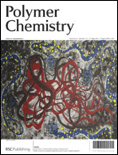
Polymer Chemistry
Exploring Innovative Solutions in Polymer ChemistryPolymer Chemistry is a premier peer-reviewed journal published by the Royal Society of Chemistry, focusing on cutting-edge research and developments in the field of polymer science. With its ISSN 1759-9954 and E-ISSN 1759-9962, this journal has established a significant impact within the academic community, as evidenced by its impressive Q1 ranking in areas such as Biomedical Engineering, Organic Chemistry, and Polymers and Plastics. Over its convergence period from 2010 to 2024, Polymer Chemistry has become an essential resource for researchers, professionals, and students, showcasing innovative studies that advance the understanding of polymer behavior and applications. The journal does not currently offer open access, allowing for a traditional but rigorous peer-review process ensuring high-quality publications. For those engaged in the rapidly evolving disciplines of biochemistry and bioengineering, Polymer Chemistry serves as a vital platform for disseminating influential findings and fostering interdisciplinary collaboration in a global context.

Polymers
Driving forward-thinking research in polymer chemistry.Polymers is a premier journal published by MDPI, dedicated to advancing the field of polymer science and technology. This open-access journal, established in 2009, has quickly gained prominence in the academic community, serving as a vital platform for disseminating high-quality research articles, reviews, and communications in the realms of chemistry, polymers, and plastics. Based in Switzerland, with an impressive ranking in the Q1 quartile for both Chemistry and Polymer studies, Polymers boasts a significant impact factor, reflecting its rigorous peer-review process and esteemed editorial board. Researchers, professionals, and students alike benefit from the broad accessibility of content, allowing for a more extensive reach and engagement within the scientific community. As a key resource for the latest advancements and innovations in polymer research, Polymers continues to lead discussions, inspire collaborations, and foster the development of novel materials that shape various industrial applications.
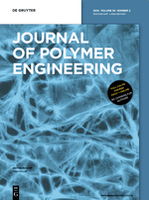
JOURNAL OF POLYMER ENGINEERING
Innovating Solutions Through Polymer Engineering.JOURNAL OF POLYMER ENGINEERING, published by Walter de Gruyter GmbH, stands as a pivotal platform in the field of polymer science and engineering. With an ISSN of 0334-6447 and an E-ISSN of 2191-0340, this journal has been a vital contributor to the academic landscape since its inception, spanning publications from 1981 to 2024. As a recognized entity in the realms of Chemical Engineering, Materials Chemistry, and Polymers and Plastics, it holds a respectable position in Q3 quartile rankings according to the latest assessments. The journal is positioned to promote the exchange of cutting-edge research findings, technological advancements, and critical reviews that address the complexities of polymer application and innovation. Researchers and professionals will find a wealth of information, from experimental methodologies to theoretical analyses, all designed to inspire and elevate the current understanding of polymer engineering. By fostering collaboration and dissemination of knowledge, the JOURNAL OF POLYMER ENGINEERING remains crucial for advancing research and education in its specialized domains.
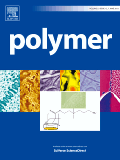
POLYMER
Elevating Knowledge in Organic and Polymer ChemistryPOLYMER, an esteemed journal published by Elsevier Science Ltd, stands at the forefront of polymer science, presenting cutting-edge research that encompasses the realms of Materials Chemistry, Organic Chemistry, and Polymers and Plastics. With a remarkable impact factor reflecting its significance in the academic community, POLYMER has been a vital resource since its inception in 1960, contributing to a converged body of knowledge through to 2024. Rated Q1 in all relevant categories as of 2023, and boasting impressive Scopus rankings, this journal not only facilitates advanced discussions in polymer synthesis, characterization, and applications but also serves as a critical platform for collaborative research among scholars, professionals, and students. While it offers content primarily via subscription, POLYMER remains dedicated to fostering innovation and excellence in the field, making it an essential read for anyone passionate about polymer science.

IRANIAN POLYMER JOURNAL
Bridging Theory and Application in Polymer ResearchWelcome to the Iranian Polymer Journal, an esteemed publication encompassing a rich history since its inception in 1996 and extending its scholarly reach up to 2024. Published by Springer from Switzerland, this journal stands out in the fields of Chemical Engineering, Materials Chemistry, and Polymers and Plastics, proudly holding a Q2 category ranking in each of these disciplines for 2023. With an ISSN of 1026-1265 and an E-ISSN of 1735-5265, the journal serves as a vital resource for researchers, professionals, and students, offering insights into polymer science and interdisciplinary applications. Although not an open-access journal, it presents an invaluable platform for high-quality research dissemination and robust peer-reviewed articles. With Scopus rankings indicating its respected position within the academic community, the Iranian Polymer Journal is committed to advancing knowledge and fostering innovation in polymer-related studies, making it an essential addition to your research library.
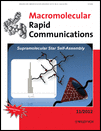
MACROMOLECULAR RAPID COMMUNICATIONS
Fostering Collaboration through Swift Scientific CommunicationMACROMOLECULAR RAPID COMMUNICATIONS, published by WILEY-V C H VERLAG GMBH in Germany, is an esteemed journal dedicated to the rapid dissemination of high-quality research in the fields of materials chemistry, organic chemistry, and polymers and plastics. With a remarkable 2023 impact factor securing its place in the prestigious Q1 category across three key disciplines, the journal ranks impressively within the top quartiles of the Scopus metrics, standing at 36th in organic chemistry and 35th in polymers and plastics. Although the journal does not offer open access options, its informative depth and innovative research make it an invaluable resource for researchers, professionals, and students seeking to stay abreast of the latest developments in macromolecular science. Covering a broad spectrum of topics from fundamental research to applications, MACROMOLECULAR RAPID COMMUNICATIONS aims to foster collaboration and inspire further advancements within the scientific community.

POLYMER SCIENCE SERIES C
Navigating the Complexities of Polymer ResearchPOLYMER SCIENCE SERIES C is a distinguished journal published by MAIK NAUKA/INTERPERIODICA/SPRINGER, focusing on advancing research in the fields of polymer science and materials chemistry. With an ISSN of 1811-2382 and an E-ISSN of 1555-614X, this journal has been actively disseminating vital findings since its inception in 2000, aiming to converge knowledge and innovations until 2024. Operating out of the United States, it stands out with its current quartile rankings of Q3 across several categories, including Chemistry (miscellaneous), Materials Chemistry, and Polymers and Plastics, highlighting its evolving significance in the academic community. Despite its open access status, the journal attracts an engaged audience of researchers, professionals, and students, providing a platform for the publication of rigorous peer-reviewed articles that explore the intricacies of polymer synthesis, characterization, and applications. POLYMER SCIENCE SERIES C not only serves as a vital resource for keeping abreast of recent developments in polymer research but also stimulates interdisciplinary collaborations and innovative approaches in material science.
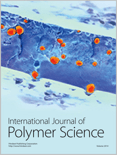
International Journal of Polymer Science
Pioneering Research in the Polymer LandscapeInternational Journal of Polymer Science is a prominent and peer-reviewed journal dedicated to advancing the field of polymer science. Published by Hindawi Ltd, this open-access journal has been making significant contributions to the discipline since its inception in 2009, ensuring that research findings are accessible to a global audience. With an impressive impact factor and positioned in the Q2 quartile for Polymers and Plastics as of 2023, it ranks 46th out of 161 in the Scopus database, reflecting its strong standing in the research community. The journal welcomes innovative research across various topics within polymer science, including synthesis, characterization, and applications in diverse industries. By providing a platform for scholars, professionals, and students, the International Journal of Polymer Science not only encourages the dissemination of knowledge but also fosters collaboration and innovation in this essential field. Based in Egypt and operating under a rigorous selection process, it remains a vital resource for anyone involved in polymer research.

Polymer Reviews
Illuminating the path of polymer research.Polymer Reviews, published by Taylor & Francis Inc, is an esteemed journal dedicated to the intricate and evolving field of polymer science. With its ISSN 1558-3724 and E-ISSN 1558-3716, the journal has established a significant presence among researchers and practitioners alike, evidenced by its impressive categorization in the Q1 quartiles across multiple disciplines, including Biomedical Engineering, Materials Chemistry, and Renewable Energy. Since its inception in 2006 and continuing through 2024, Polymer Reviews has consistently aimed to advance the knowledge base of polymer applications and innovations, providing a platform for comprehensive review articles that stimulate further research and inspire practical solutions. The journal, ranking within the top percentile across several Scopus categories, underscores its impact and relevance in a rapidly developing scientific landscape. Though not an open-access journal, it remains a vital resource for those invested in the future of materials science and engineering.

MACROMOLECULAR RESEARCH
Leading the Charge in Macromolecular ResearchMACROMOLECULAR RESEARCH, published by the POLYMER SOC KOREA, is a premier journal dedicated to advancing the field of macromolecular science and polymer engineering. With its ISSN 1598-5032 and E-ISSN 2092-7673, this journal has emerged as a vital platform for researchers and professionals interested in the application and development of polymers across various domains. Based in South Korea and operating as an open-access resource since its inception in 2002, MACROMOLECULAR RESEARCH consistently ranks in the Q2 category across diverse fields such as Chemical Engineering, Materials Chemistry, and Organic Chemistry as per the latest 2023 metrics. Notably, it is recognized for its substantial contributions to polymery science, increasing its visibility and impact in global research. By providing a forum for original research articles, reviews, and innovative methodologies, this journal aims to foster collaboration and knowledge sharing among scientists, engineers, and students alike. Join a community that is at the forefront of polymer research by exploring the wealth of resources and cutting-edge studies featured in MACROMOLECULAR RESEARCH.